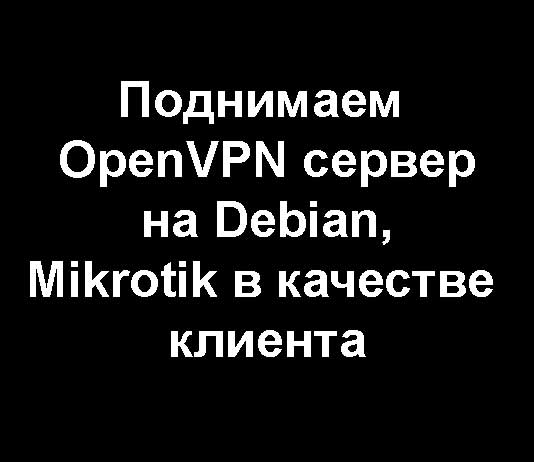Поднимаем OpenVPN сервер на Debian, Mikrotik в качестве клиента
Для начала нужно определиться с хостингом, я выбираю ТаймВэб, хорошая цена, надежно, быстро. Нам подойдет VPS / VDS хостинг, стоимость от 170 р. Выбрать можно по ссылке https://vk.cc/9RxS1Z
Покупаем сервер, на почту приходят логин и пароль, далее авторизуемся на сервере и начинаем.
КОД:
apt update && apt upgrade -yЗатем ставим то, с чем мы будем работать. У всех разные наборы пакетов. Я как минимум ставлю набор для компиляции ( хоть и редко пользуюсь им), привычный текстовый редактор и иногда файловый менеджер.
КОД:
apt install nano build-essential mcКОД:
ssh-keygenКОД:
Enter file in which to save the key (/root/.ssh/id_rsa):КОД:
ssh -i ~/.ssh/id_rsa_ihor -p 52222 [email protected]КОД:
touch /root/.ssh/configКОД:
Host IP-client
IdentityFile ~/.ssh/id_rsa_ihorНе забываем перезагрузить ssh
КОД:
/etc/init.d/ssh restartКОД:
apt install openvpnКОД:
Do you want to continue? [Y/n] YКОД:
cp -r /usr/share/easy-rsa /etc/openvpn/easy-rsa
cd /etc/openvpn/easy-rsaКОД:
nano varsКОД:
export KEY_SIZE=1024
export KEY_COUNTRY="RU"
export KEY_PROVINCE="MO"
export KEY_CITY="Moscow"
export KEY_ORG="MyHome-MyFort"
export KEY_EMAIL="[email protected]"
export KEY_OU="NoAdmin"КОД:
touch openssl.cnf
nano openssl.cnfКОД:
# For use with easy-rsa version 2.0 and OpenSSL 1.0.0*
# This definition stops the following lines choking if HOME isn't
# defined.
HOME = .
RANDFILE = $ENV::HOME/.rnd
openssl_conf = openssl_init
[ openssl_init ]
# Extra OBJECT IDENTIFIER info:
#oid_file = $ENV::HOME/.oid
oid_section = new_oids
engines = engine_section
# To use this configuration file with the "-extfile" option of the
# "openssl x509" utility, name here the section containing the
# X.509v3 extensions to use:
# extensions =
# (Alternatively, use a configuration file that has only
# X.509v3 extensions in its main [= default] section.)
[ new_oids ]
# We can add new OIDs in here for use by 'ca' and 'req'.
# Add a simple OID like this:
# testoid1=1.2.3.4
# Or use config file substitution like this:
# testoid2=${testoid1}.5.6
####################################################################
[ ca ]
default_ca = CA_default # The default ca section
####################################################################
[ CA_default ]
dir = $ENV::KEY_DIR # Where everything is kept
certs = $dir # Where the issued certs are kept
crl_dir = $dir # Where the issued crl are kept
database = $dir/index.txt # database index file.
new_certs_dir = $dir # default place for new certs.
certificate = $dir/ca.crt # The CA certificate
serial = $dir/serial # The current serial number
crl = $dir/crl.pem # The current CRL
private_key = $dir/ca.key # The private key
RANDFILE = $dir/.rand # private random number file
x509_extensions = usr_cert # The extentions to add to the cert
# Extensions to add to a CRL. Note: Netscape communicator chokes on V2 CRLs
# so this is commented out by default to leave a V1 CRL.
# crl_extensions = crl_ext
default_days = 3650 # how long to certify for
default_crl_days= 30 # how long before next CRL
default_md = sha256 # use public key default MD
preserve = no # keep passed DN ordering
# A few difference way of specifying how similar the request should look
# For type CA, the listed attributes must be the same, and the optional
# and supplied fields are just that :-)
policy = policy_anything
# For the CA policy
[ policy_match ]
countryName = match
stateOrProvinceName = match
organizationName = match
organizationalUnitName = optional
commonName = supplied
name = optional
emailAddress = optional
# For the 'anything' policy
# At this point in time, you must list all acceptable 'object'
# types.
[ policy_anything ]
countryName = optional
stateOrProvinceName = optional
localityName = optional
organizationName = optional
organizationalUnitName = optional
commonName = supplied
name = optional
emailAddress = optional
####################################################################
[ req ]
default_bits = $ENV::KEY_SIZE
default_keyfile = privkey.pem
default_md = sha256
distinguished_name = req_distinguished_name
attributes = req_attributes
x509_extensions = v3_ca # The extentions to add to the self signed cert
# Passwords for private keys if not present they will be prompted for
# input_password = secret
# output_password = secret
# This sets a mask for permitted string types. There are several options.
# default: PrintableString, T61String, BMPString.
# pkix : PrintableString, BMPString (PKIX recommendation after 2004).
# utf8only: only UTF8Strings (PKIX recommendation after 2004).
# nombstr : PrintableString, T61String (no BMPStrings or UTF8Strings).
# MASK:XXXX a literal mask value.
string_mask = nombstr
# req_extensions = v3_req # The extensions to add to a certificate request
[ req_distinguished_name ]
countryName = Country Name (2 letter code)
countryName_default = $ENV::KEY_COUNTRY
countryName_min = 2
countryName_max = 2
stateOrProvinceName = State or Province Name (full name)
stateOrProvinceName_default = $ENV::KEY_PROVINCE
localityName = Locality Name (eg, city)
localityName_default = $ENV::KEY_CITY
0.organizationName = Organization Name (eg, company)
0.organizationName_default = $ENV::KEY_ORG
# we can do this but it is not needed normally :-)
#1.organizationName = Second Organization Name (eg, company)
#1.organizationName_default = World Wide Web Pty Ltd
organizationalUnitName = Organizational Unit Name (eg, section)
#organizationalUnitName_default =
commonName = Common Name (eg, your name or your server\'s hostname)
commonName_max = 64
name = Name
name_max = 64
emailAddress = Email Address
emailAddress_default = $ENV::KEY_EMAIL
emailAddress_max = 40
# JY -- added for batch mode
organizationalUnitName_default = $ENV::KEY_OU
commonName_default = $ENV::KEY_CN
name_default = $ENV::KEY_NAME
# SET-ex3 = SET extension number 3
[ req_attributes ]
challengePassword = A challenge password
challengePassword_min = 4
challengePassword_max = 20
unstructuredName = An optional company name
[ usr_cert ]
# These extensions are added when 'ca' signs a request.
# This goes against PKIX guidelines but some CAs do it and some software
# requires this to avoid interpreting an end user certificate as a CA.
basicConstraints=CA:FALSE
# Here are some examples of the usage of nsCertType. If it is omitted
# the certificate can be used for anything *except* object signing.
# This is OK for an SSL server.
# nsCertType = server
# For an object signing certificate this would be used.
# nsCertType = objsign
# For normal client use this is typical
# nsCertType = client, email
# and for everything including object signing:
# nsCertType = client, email, objsign
# This is typical in keyUsage for a client certificate.
# keyUsage = nonRepudiation, digitalSignature, keyEncipherment
# This will be displayed in Netscape's comment listbox.
nsComment = "Easy-RSA Generated Certificate"
# PKIX recommendations harmless if included in all certificates.
subjectKeyIdentifier=hash
authorityKeyIdentifier=keyid,issuer:always
extendedKeyUsage=clientAuth
keyUsage = digitalSignature
# This stuff is for subjectAltName and issuerAltname.
# Import the email address.
# subjectAltName=email:copy
subjectAltName=$ENV::KEY_ALTNAMES
# Copy subject details
# issuerAltName=issuer:copy
#nsCaRevocationUrl = http://www.domain.dom/ca-crl.pem
#nsBaseUrl
#nsRevocationUrl
#nsRenewalUrl
#nsCaPolicyUrl
#nsSslServerName
[ server ]
# JY ADDED -- Make a cert with nsCertType set to "server"
basicConstraints=CA:FALSE
nsCertType = server
nsComment = "Easy-RSA Generated Server Certificate"
subjectKeyIdentifier=hash
authorityKeyIdentifier=keyid,issuer:always
extendedKeyUsage=serverAuth
keyUsage = digitalSignature, keyEncipherment
subjectAltName=$ENV::KEY_ALTNAMES
[ v3_req ]
# Extensions to add to a certificate request
basicConstraints = CA:FALSE
keyUsage = nonRepudiation, digitalSignature, keyEncipherment
[ v3_ca ]
# Extensions for a typical CA
# PKIX recommendation.
subjectKeyIdentifier=hash
authorityKeyIdentifier=keyid:always,issuer:always
# This is what PKIX recommends but some broken software chokes on critical
# extensions.
#basicConstraints = critical,CA:true
# So we do this instead.
basicConstraints = CA:true
# Key usage: this is typical for a CA certificate. However since it will
# prevent it being used as an test self-signed certificate it is best
# left out by default.
# keyUsage = cRLSign, keyCertSign
# Some might want this also
# nsCertType = sslCA, emailCA
# Include email address in subject alt name: another PKIX recommendation
# subjectAltName=email:copy
# Copy issuer details
# issuerAltName=issuer:copy
# DER hex encoding of an extension: beware experts only!
# obj=DER:02:03
# Where 'obj' is a standard or added object
# You can even override a supported extension:
# basicConstraints= critical, DER:30:03:01:01:FF
[ crl_ext ]
# CRL extensions.
# Only issuerAltName and authorityKeyIdentifier make any sense in a CRL.
# issuerAltName=issuer:copy
authorityKeyIdentifier=keyid:always,issuer:always
[ engine_section ]
#
# If you are using PKCS#11
# Install engine_pkcs11 of opensc (www.opensc.org)
# And uncomment the following
# verify that dynamic_path points to the correct location
#
#pkcs11 = pkcs11_section
[ pkcs11_section ]
engine_id = pkcs11
dynamic_path = /usr/lib/engines/engine_pkcs11.so
MODULE_PATH = $ENV::PKCS11_MODULE_PATH
PIN = $ENV::PKCS11_PIN
init = 0
КОД:
source ./vars
./clean-all
./build-ca
./build-key-server server-ihor
./build-key vasya
./build-key petya
./build-key pasha
./build-key yulya
./build-key phone
./build-dh
cd keys
mkdir /etc/openvpn/.keys
cp ca.crt ca.key dh1024.pem server-ihor.crt server-ihor.key /etc/openvpn/.keysКОД:
nano /etc/sysctl.confКОД:
net.ipv4.ip_forward=1КОД:
sysctl -pКОД:
touch /etc/openvpn/server.conf
nano /etc/openvpn/server.confКОД:
port 1194
proto tcp
dev tun
ca .keys/ca.crt
cert .keys/server-ihor.crt
key .keys/server-ihor.key
dh .keys/dh1024.pem
# topology subnet
server 10.100.0.0 255.255.255.0
client-config-dir .ccd
client-to-client
keepalive 10 120
tun-mtu 1500
mssfix 1450
cipher AES-256-CBC # AES
auth sha1
user nobody
group nogroup
persist-key
persist-tun
status /var/log/openvpn-status.log
log /var/log/openvpn.log
verb 3
mute 10КОД:
mkdir /etc/openvpn/.ccdКОД:
nano /etc/openvpn/.ccd/vasyaКОД:
# Клиентская подсеть за vasya (192) и адрес openvpn у роутера (10)
iroute 192.168.188.0 255.255.255.0 10.100.0.2
# Добавим шлюз по умолчанию для машин за клиентом vasya, заодно закрепим адрес.
ifconfig-push 10.100.0.2 10.100.0.1КОД:
systemctl enable openvpn
service openvpn restartКОД:
ip link showКОД:
iptables -t nat -A POSTROUTING -o ens3 -j MASQUERADEКОД:
nano /etc/rc.localКОД:
#!/bin/sh -e
#
# rc.local
#
# This script is executed at the end of each multiuser runlevel.
# Make sure that the script will "exit 0" on success or any other
# value on error.
#
# In order to enable or disable this script just change the execution
# bits.
#
# By default this script does nothing.
iptables -t nat -A POSTROUTING -o ens3 -j MASQUERADE
exit 0КОД:
chmod +x /etc/rc.localКОД:
nano /etc/systemd/system/rc-local.serviceКОД:
[Unit]
Description=/etc/rc.local Compatibility
ConditionPathExists=/etc/rc.local
[Service]
Type=forking
ExecStart=/etc/rc.local start
TimeoutSec=0
StandardOutput=tty
RemainAfterExit=yes
SysVStartPriority=99
[Install]
WantedBy=multi-user.targetКОД:
systemctl enable rc-local
systemctl start rc-localКОД:
systemctl status rc-localКОД:
certificate import file-name=ca.crt
certificate import file-name=vasya.crt
certificate import file-name=vasya.keyКОД:
ppp profile
add name=ovpn-vasya
/ppp secret
add local-address=10.100.0.2 name=ovpn-vasya profile=ovpn-vasya remote-address=10.100.0.1 service=ovpn
/interface ovpn-client add certificate=vasya.crt_0 cipher=aes256 connect-to=ХХХ.ХХХ.ХХХ.ХХХ name=ovpn-vasya port=1194 profile=ovpn-vasya
user=ovpn-vasyaКОД:
/ip firewall mangle
add action=mark-routing chain=prerouting comment=vpn_rout dst-address-list="Vasya address" new-routing-mark=vpn_rout passthrough=yes
/ip firewall nat
add action=masquerade chain=srcnat comment=vasya dst-address-list="Vasya address" out-interface=ovpn-vasya src-address-list="Vasya user"
/ip route
add comment=ovpn-vasya distance=2 gateway=10.100.0.1 routing-mark=vpn_routисточник





















